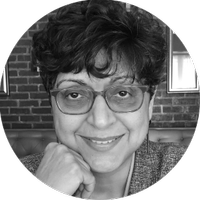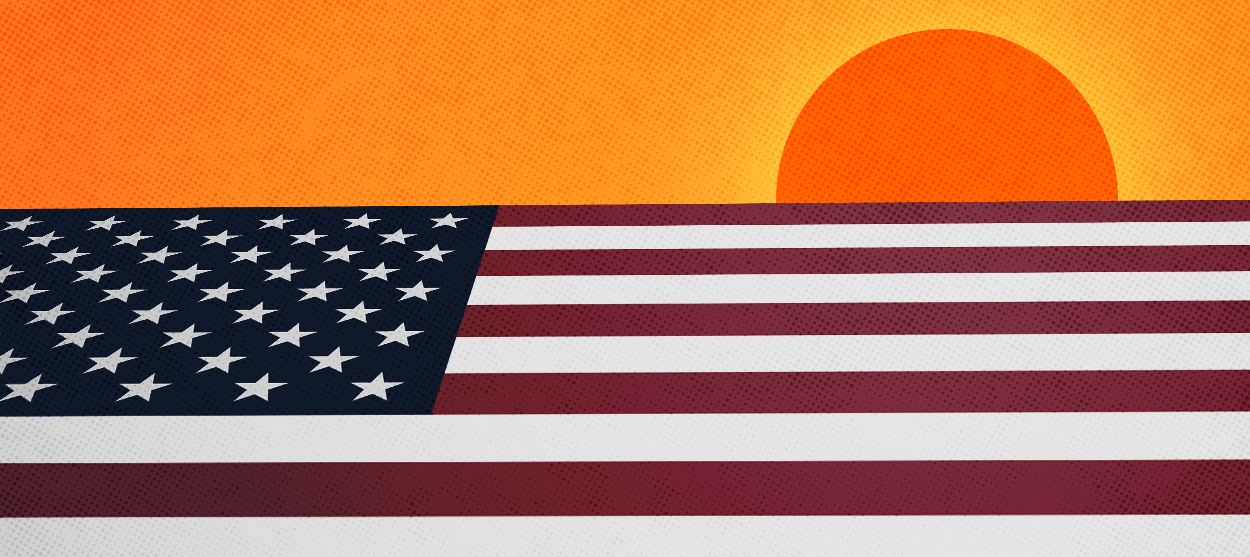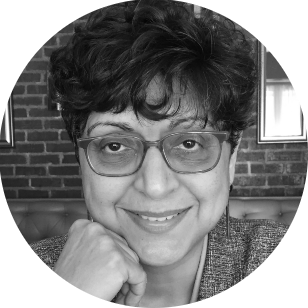It's not dark yet, but it's getting there: An immigrant's lament
Does the welcoming, large-hearted America I immigrated to still exist?


A free daily email with the biggest news stories of the day – and the best features from TheWeek.com
You are now subscribed
Your newsletter sign-up was successful
My first week in Ohio, I went grocery shopping and bought a large watermelon, along with four bags of groceries, most of them frozen dinners. I was a sheltered kid from India who hadn't learned how to cook, so those dinners and take-out meals kept me alive my first six months in America.
After I'd paid for the groceries I went to pick up those bags and couldn't lift them. There was no way I could carry them across the huge parking lot to the bus stop. In desperation, I stopped a fellow shopper, a well-dressed older woman, pointed to my bags and asked for a ride home. She looked distressed. "I'm sorry, my dear," she said. "I'm headed in exactly the opposite direction."
I nodded. The cashier took pity on me and said I could wheel the shopping cart to the bus stop. So that's what I did. I had no idea what I'd do once the bus dropped me off near my apartment.
The Week
Escape your echo chamber. Get the facts behind the news, plus analysis from multiple perspectives.

Sign up for The Week's Free Newsletters
From our morning news briefing to a weekly Good News Newsletter, get the best of The Week delivered directly to your inbox.
From our morning news briefing to a weekly Good News Newsletter, get the best of The Week delivered directly to your inbox.
As I stood waiting for the bus, a black car drew up to me. The driver was the woman who had refused to give me a ride. Now, she leaned over to open her car door. "Get in," she said. "I'll drop you off."
"But ... you said ..."
"It's okay," she answered. "It's not that out of my way."
She may as well have said: Welcome to America.
A free daily email with the biggest news stories of the day – and the best features from TheWeek.com
She may as well have said: This is us, Americans, the friendly, generous people you saw in the Hollywood movies you were raised on, who populated the Steinbeck and Hemingway novels you grew up reading, who lived in the Bob Dylan and Simon and Garfunkel songs that Pied Pipered you to these shores. This is us, a people who welcome strangers and turn them into friends.
That large-heartedness! How well I remember it. It took so many forms — the bus passengers who shared the most intimate details of their lives in the time it took to travel the few blocks from my apartment to the grocery store. (Who are these people? I'd think, smitten. So guileless and childlike.) The history major sitting on a park bench at Ohio State who explained what a credit hour was and helped me select my journalism courses for my first semester there. My new friends, who, within a couple of months insisted that I go home to Georgia with them for Christmas. The old immigration officer who stamped my passport after I'd returned from a quick trip to India. "Welcome home," he said.
Welcome home.
I became a citizen 10 years later, but America had felt like home almost immediately after I arrived. Steeped in Americana as I'd been — Archie comic books and Mad magazine, Dustin Hoffman movies and Joan Baez songs, Walt Whitman and Woody Guthrie — it felt as familiar as skin. I fell for it hard, all of it — its expansiveness, its bravado, the redemptive nature of its national mythology, the narrative of reinvention, and above all, the thing that my fellow grad students repeated like a mantra: We are a nation of immigrants.
For the next three decades I led a charmed life. On the streets, I felt comfortable in my brown skin, even as I was aware that my good English, my education and my class privilege protected me from challenges other, poorer immigrants faced. America showered its bounty on me, made all my dreams come true.
And for all outward appearances, things are as they were, even today. I still have a good job, a home, a large community of friends.
And yet.
These days, when I pass a stranger on the street, an unwelcome thought crosses my mind — Do you not want me here? I think. When you see me, what do you see? My old carefreeness, that blitheness, is gone, replaced by an excruciating self-consciousness. Now, when I hire a carpenter or a roofer from rural Ohio for a job, I find myself being excessively kind and polite, as if to telegraph: You don't have anything to fear from me. Me, a middle-aged writer and academic who has never so much as held a gun in her hand, feeling as if I have to explain my harmlessness.
Recently, a mason from "the country" asked me on the phone, "Is there looting and burning going on in your neighborhood? I haven't taken a job in Cleveland in months because of the looters." For a second, I wondered if he was pulling my leg. After all, I live in a leafy, tranquil inner-ring suburb. Then I remembered. My cosmopolitan suburb also has minorities and immigrants in it. Suddenly, a guy who had done work for me in the past was scared to visit. "Kevin," I laughed. "I'll bet you my neighborhood is safer than where you live." He came. I'm pretty sure nothing untoward happened to him while he was here.
People on the right often make a big deal about how they have no problems with people like me, those of us who came here legally, as opposed to "illegals." But when I see those pictures of babies in cages I think, there but for the grace of God go I. I see the quiet assaults that are already being made on legal immigration, new restrictions and new rules for who is welcome to this country. I am not Muslim, but the Muslim ban hurts me. When President Trump talks to his audiences about "our country" and insinuates that Rep. Ilhan Omar is not American, I wonder if the people around me see me as fully American. In so many ways, this isn't the country I came to. That country had a spirit as big as the sky in Montana. That America believed in science and math and facts and technology. This new, unfamiliar country feels ... small. Pinched. Paranoid. Filled with people who are susceptible to superstition and conspiracy theories and cults. They remind me of the poor, illiterate masses in India, who worship movie stars as Gods and believe in con men masquerading as holy men. But many of those people don't know how to read or write, much less discern truth from fiction. What excuse do I make for my fellow Americans, who have had the privilege of a free public education, who have access to free public libraries, who have the world of information at their fingertips, but choose instead to dwell in the ignorant dark?
Sometimes I wonder who has it worse, my native-born American friends mourning the death of the America they grew up in or immigrants like myself, who gave up our families and countries to be here? When my native-born friends speak of fleeing the country if things don't change in November, I remain silent. I have already changed homelands once. I know too well the emotional toll such a migration takes. Besides, I refuse to abandon my country in its hour of need. I'm not going anywhere.
I should explain again that this battle that rages within me is entirely internal. My outward life, with all its privileges, remains unchanged. No one has called me a racial slur on the street (yet). I feel respected by my colleagues (still). My angst and despair, however, is real. I'm not making it up. For the last four years, I've been in mourning for the death of a country I once knew. I still believe in its redemption narrative, I do think there's time to right this ship. The question is, how much time do we have left?
In the words of Bob Dylan, whose siren song led me to America more than three decades ago: It's not dark yet, but it's getting there.
Thrity Umrigar is the bestselling author of eight novels, including The Space Between Us and Everybody’s Son. Her latest picture book, Sugar in Milk, is a recounting of an ancient legend about immigration and the importance of kindness. She lives in Cleveland, Ohio.
